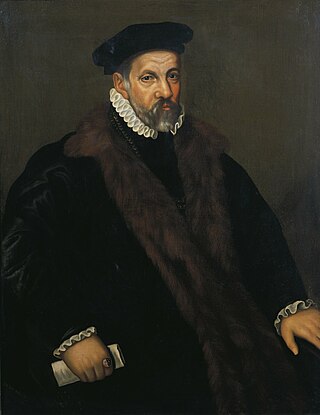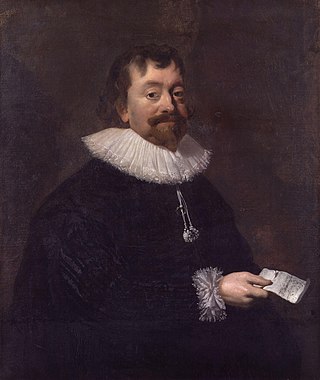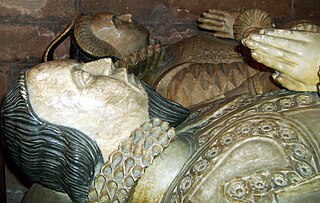
William Paget, 1st Baron Paget of Beaudesert, was an English statesman and accountant who held prominent positions in the service of Henry VIII, Edward VI and Mary I.

Henry Somerset, 1st Duke of Beaufort, KG, PC was an English politician who sat in the House of Commons at various times between 1654 and 1667, when he succeeded his father as 3rd Marquess of Worcester. He was styled Lord Herbert from 1644 until 3 April 1667. The Dukedom of Beaufort was bestowed upon him by King Charles II in 1682.
John Stewart, 4th Earl of Atholl, called the Fair, was a Scottish nobleman and courtier. He was favoured by Mary, Queen of Scots, but later turned against her.
George Gordon, 1st Marquess of Huntly was a Scottish nobleman who took a leading role in the political and military life of Scotland in the late 16th century, and around the time of the Union of the Crowns.
Thomas Norton was an English lawyer, politician, writer of verse, and playwright.
Sir Peter Wentworth (1529–1596) was a prominent Puritan leader in the Parliament of England. He was the elder brother of Paul Wentworth and entered as member for Barnstaple in 1571. He later sat for the Cornish borough of Tregony in 1578 and for the town of Northampton in the parliaments of 1586–7, 1589, and 1593. Wentworth was the chief critic of Queen Elizabeth I, and Wentworth's 1576 Parliament address has been regarded as the sign of a new era in English Parliament politicking. Recorded speeches and parliament sessions, jotted in the diaries of MPs like those of Thomas Cromwell, began to proliferate around this time, when public interest embraced political affairs and when issues such as freedom of speech took root in parliamentary politics. For these reasons, Wentworth is often regarded as the first celebrated English parliamentarian.

Sir William Wade was an English statesman and diplomat, and Lieutenant of the Tower of London.

Thomas Wilson (1524–1581), Esquire, LL.D., was an English diplomat and judge who served as a privy councillor and Secretary of State (1577–81) to Queen Elizabeth I. He is remembered especially for his Logique (1551) and The Arte of Rhetorique (1553), which have been called "the first complete works on logic and rhetoric in English".
Events from the year 1646 in England. This is the fifth and last year of the First English Civil War, fought between Roundheads (Parliamentarians) and Cavaliers.
Events from the 1550s in England. This decade marks the beginning of the Elizabethan era.
Events from the 1580s in England.
Events from the 1610s in England.
Events from the 1620s in England. This decade sees a change of monarch.
Sir Trevor Williams, 1st Baronet of Llangibby, Monmouthshire, was a Welsh gentry landowner and politician who sat in the House of Commons at various times between 1660 and 1692. He played a significant part in events during and after the English Civil War in South Wales, siding first with King Charles, then with the Parliamentarians, before rejoining the Royalists in 1648.

The Oaten Hill Martyrs were Catholic Martyrs who were executed by hanging, drawing and quartering at Oaten Hill, Canterbury, on 1 October 1588. The gallows had been put up in 1576. These four were beatified by Pope Pius XI in 1929.

Robert Beale was an English diplomat, administrator, and antiquary in the reign of Elizabeth I. As Clerk of the Privy Council, Beale wrote the official record of the execution of Mary, Queen of Scots, to which he was an eyewitness.

Sir Robert Phelips was an English politician who sat in the House of Commons at various times between 1604 and 1629. In his later Parliaments he was one of the leading spirits in the House of Commons and an opponent of James I, Charles I and their adviser Buckingham.
Sir Richard Page was an English courtier. He was a gentleman of the Privy Chamber at the court of Henry VIII of England, and Vice-Chamberlain in the household of Henry VIII's illegitimate son, Henry FitzRoy. Page was imprisoned in the Tower of London in 1536 during the downfall of Anne Boleyn. He married Elizabeth Bourchier, the mother-in-law of the Protector Somerset

John Giffard (1534–1613) was a Staffordshire landowner and Member of the English Parliament, notable as a leader of Roman Catholic Recusancy in the reigns of Elizabeth I and James I.
Thomas Somerset was MP for Monmouthshire, Catholic prisoner under Elizabeth I.







